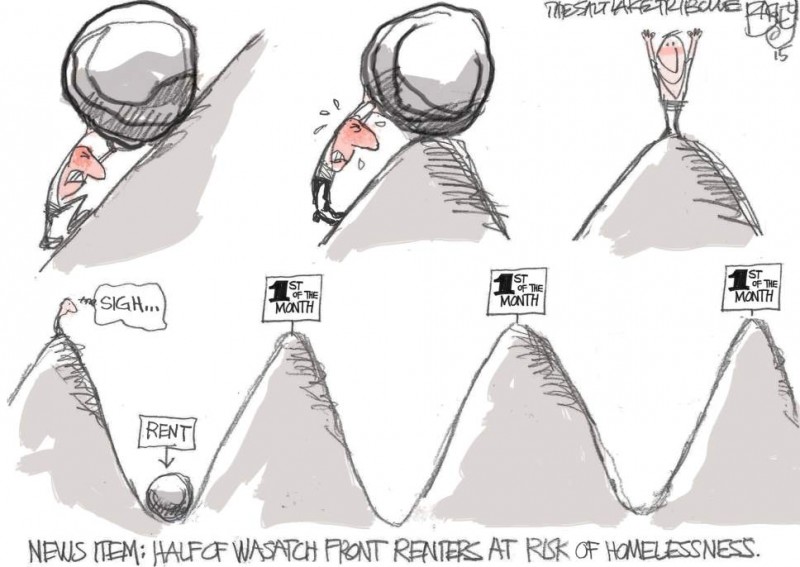Rental Discord: Landlord vs. Tenant
Published On: December 18, 2015 Posted by: Jeremy Peterson
Landlords want rents to be as high as possible. Tenants want rents to be as low as possible. So somewhere in the mix, rents are established that meet the needs of both parties…or so it would seem. The free market of housing works pretty well most of the time. But sometimes, for sociological reasons, things don’t work out well for either party.
The Salt Lake Tribute recently posted this political cartoon lampooning the plight of tenants. It made me laugh. But the caption at the bottom was disturbing. How is it that “half” of Wasatch Front renters are at risk of homelessness? By what measure? In my view, it would seem this claim is dubious given that this half of Wasatch Front renters are employed (otherwise they wouldn’t be responsible for rent payments), and if a rental becomes too expensive, they could trade down if necessary.
Rising rents are a good thing for landlords. However, it is only good in the long term if the income of tenants who want to lease the property is increasing with it. For instance, lets say that rents in a given area for a given property are $1000/mo. and they have been that way for several years. Then, a hospital is built in the neighborhood and now doctors and support staff want to live in that neighborhood. What happens to the rents? Well, doctors may be willing to pay more than $1000/mo. because they can afford more. Meanwhile, the tenant that has been there for the past several years can’t afford the same rents the doctors are willing to pay. What happens? In this case its likely the landlord would politely decline to renew the old tenant’s lease, increase the rents, and then lease the property to the more affluent tenants that are willing to pay the higher rents. This is a winning scenario.
However, lets take the same property and $1000/mo. rents but this time a hospital is not built in the neighborhood. Yet, the landlord believes he should raise the rents $150. What happens now? In this scenario the tenant has a hard choice to make. Do they move to another property that is $1000/mo.? Or, do they stick it out, pay the rent, and go to a bean and rice diet? In my experience, if the rents are truly out of line with what the tenants in the area are willing to pay, the property will be vacated and sit vacant until rents come down to a price point that makes economic sense. In this scenario the tenants balk and the landlord suffers. This is a losing scenario.
Yet, sometimes tenants do not know their own economic self-interest. If rents are $1000/mo and a tenant earns $1,500/mo., can the tenant truly afford the rents? Sadly, I have seen tenants apply to rent properties with this impossible approach. Ideally, only 1/3rd of a tenant’s income should be spent on rent. Anything above that begins to make for an unstable rent situation for both the tenant and the landlord. I once managed a very low-end 5-plex where a 2 bedroom unit was renting for $500/mo. But, the tenant paid me just $75/week with a promise to get caught up the next week. I inherited this tenant and I kept scratching my head at this behavior. After a couple months of watching this guy get hopelessly behind on rent, I asked him about his income. He was only making $900/mo….and his weekly payments were adding up to around $300/mo. Nature was taking its course here. Unfortunately, the previous property managers had leased the property to a tenant who basically didn’t qualify to rent the space based on the 33% rule. What appeared to be a winning scenario up front in reality turned out to be a big time losing scenario.
This brings us back to our cartoon. The drudgery of paying rent at the first of the month is only as difficult as a tenant is willing to make it for themselves, or as difficult as an unwise landlord is willing to make it for their tenants. Landlords have a duty to screen the circumstances of their tenants for economic viability and tenants have the duty to understand their own best interest. Landlords who knowingly ensnare tenants in a hopeless poverty trap are behaving unethically and ultimately unprofitably. Likewise, tenants who do not know or exercise their own best interest do a severe disservice to themselves and and their landlord.
So, let’s follow the natural laws of economics and make life great for both the landlords and their tenants.




